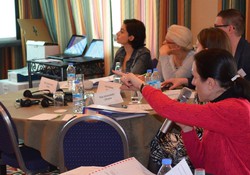WHO conducts infectious substances shipping training for national influenza centres from 19 countries

WHO
24 specialists from 19 countries achieved certification after attending WHO's infectious substances shippers training (ISST) in Tbilisi, Georgia on 2–4 May 2016.
The trainees came from: Azerbaijan, Belarus, Bosnia and Herzegovina, Cyprus, Estonia, Georgia, Iceland, Kazakhstan, Kyrgyzstan, Latvia, Lithuania, Poland, the Republic of Moldova, the Russian Federation, Serbia, Tajikistan, Turkey, Turkmenistan and Ukraine. Participants included 17 influenza laboratory experts from national influenza centres and 7 representatives from both public health microbiology laboratories and national reference centres in their countries.
Infectious substance shipments are highly regulated and, incorrectly handled, can pose a risk to laboratory staff, the public and the environment. The ISST course therefore trains participants not only in the completion of shipping documentation, but also in the safe assembly of infectious substance packages.
Only participants scoring ≥ 80% in the final test receive certification, which is valid for 24 months and recognized by both the International Civil Aviation Organization and the International Air Transport Association. After this period, participants can renew their credentials through WHO's online Electronic Infectious Substances Shipping Training refresher course.
The training was provided by the Influenza and Other Respiratory Pathogens Programme of the WHO Regional Office for Europe in collaboration with WHO headquarters and the WHO Country Office in Georgia. It is part of the Pandemic Influenza Preparedness Framework Partnership Contribution Implementation Plan 2013–2016 in the area of laboratory and surveillance.
Since 2007, over 350 specialists from the WHO European Region have been ISST-trained.
Background
To protect staff, the public and the environment, the transport of infectious substances is strictly regulated and training is required to ensure compliance with the regulations. The goal of the training was to strengthen the capacity of members of the WHO Global Influenza Surveillance and Response System in the WHO European Region to properly ship infectious substances both nationally and internationally in order to minimize the risk of exposure.



